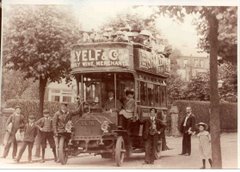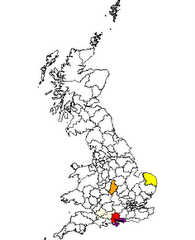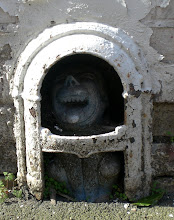
Convicted of fraud, sentenced to transportation and lucky to escape execution - William Wheeler Yelf must have felt himself at the lowest possible ebb as he was removed from his family and taken up to London to await transportation. What is interesting is that his printing business seems to have carried on unaffected. Certainly there is no mention of a crisis in 'Printers Pride' and as was seen, the business eventually passed smoothly on to Richard Yelf. Had the Bank recouped all it's losses? Did they take pity on the innocent members of the family? We don't know, but for William, with his health failing, being placed in prison must have been the last straw. Millbank prison, on the bank of the Thames, was the point of embarkation for those sentenced to transportation. Charles Dickens noted in his Dickens's Dictionary of London, 1879
Millbank Prison stands on the river bank, near Vauxhall-bridge. It is built on Benthams “Panopticon” plan, six different buildings radiating from a common centre. The building is intended to hold 1,000 prisoners, and cost half-a-million, which, with ground rent, &c., represents an outlay per head for rent, &c, of about £50 per annum, or, as the prison is rarely more than half full, practically not far short of £100. Prisoners pass through here from Newgate and elsewhere as the first stage of “penal servitude,” and the discipline is somewhat severe. Orders to view from Home Secretary, or Directors of Convict Prisons, 44 Parliament-street, S.W. NEAREST Railway Station, Vauxhall; Omnibus Routes, Vauxhall-bridge-road and Palace-road ; Cab Rank, Vauxhall-bridge.The site of the prison is now covered by the Tate Gallery, but the small steps, especially designed for prisoners in leg-irons, are still visible leading down to the river bank. Incarceration in such dismal surroundings must have taken its toll and sickness eventually overcame William. Before he could be transported he died in Prison on 9th March 1854, nine months after he was convicted. His death certificate states that he died of bronchitis and disease of the heart. I've no idea where he was buried, but it seems the family were able to 'gloss over' this unfortunate episode and the overstamping of William Richards initials on his father's might have been a strong symbolic act. News of his final demise was noted in a curt report in the 'Bankers Magazine and Journal of the Money Market' of 1854.
ISLE OF WIGHT SAVINGS BANK - Yelf, the fraudulent Isle of Wight actuary, died at the Millbank Penitentiary in the early part of March



1 comment:
There is a record of his burial which was at Victoria Park Cemetery, Hackney
Post a Comment